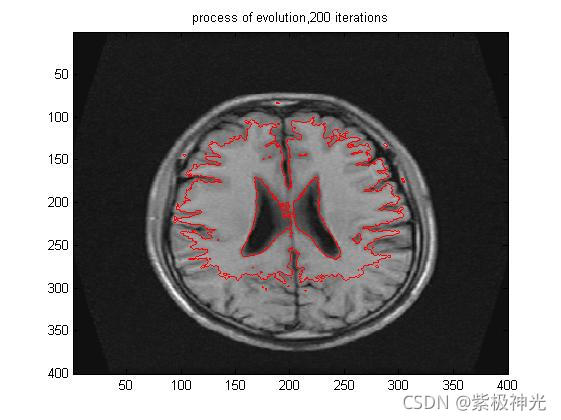【图像分割】基于matlab C-V模型水平集图像分割【含Matlab源码 1456期】
【摘要】
一、获取代码方式
获取代码方式1: 通过订阅紫极神光博客付费专栏,凭支付凭证,私信博主,可获得此代码。
获取代码方式2: 完整代码已上传我的资源:【图像分割】基于matlab C-V模型水平集图像分割...
一、获取代码方式
获取代码方式1:
通过订阅紫极神光博客付费专栏,凭支付凭证,私信博主,可获得此代码。
获取代码方式2:
完整代码已上传我的资源:【图像分割】基于matlab C-V模型水平集图像分割【含Matlab源码 1456期】
备注:
订阅紫极神光博客付费专栏,可免费获得1份代码(有效期为订阅日起,三天内有效);
二、图像分割简介
理论知识参考:【基础教程】基于matlab图像处理图像分割【含Matlab源码 191期】
三、部分源代码
% Matlad code implementing Chan-Vese model in the paper 'Active Contours Without Edges'
%
clear all;
close all;
Img=imread('Head.bmp');
% Img=imread('vessel3.bmp'); % Note: this an example of images with intensity inhomogeneity.
% CV model does not work for this image.
Img=double(Img(:,:,1));
% get the size
[nrow,ncol] =size(Img);
ic=nrow/2;
jc=ncol/2;
r=10; %起始园半径
initialLSF = sdf2circle(nrow,ncol,ic,jc,r);
u=initialLSF;
numIter = 200;
timestep = 0.5;
lambda_1=1;
lambda_2=1;
% h = 1;
h = 1;
epsilon=1;
nu = 0.001*255*255; % tune this parameter for different images
% figure;
% imagesc(Img,[0 255]);colormap(gray)
% hold on;
% contour(u,[0 0],'r');
% start level set evolution
% for k=1:numIter
% u=EVOL_CV(Img, u, nu, lambda_1, lambda_2, timestep, epsilon, 1); % update level set function
% if mod(k,10)==0
% pause(.1);
% imagesc(Img,[0 255]);colormap(gray)
% hold on;
% contour(u,[0 0],'r');
% hold off;
% end
% end;
% start level set evolution
% figure;
% imagesc(Img, [0, 255]);colormap(gray);hold on;
% contour(u,[0 0],'r');
% title('Initial contour');
for k=1:numIter
u=EVOL_CV(Img, u, nu, lambda_1, lambda_2, timestep, epsilon, 1); % update level set function
if mod(k,10)==0
pause(.1);
imagesc(Img,[0 255]);colormap(gray)
hold on;
contour(u,[0 0],'r');
iterNum=[num2str(k), ' iterations'];
title(['process of evolution,',iterNum]);
hold off;
end
end;
figure;
imagesc(Img, [0, 255]);colormap(gray);hold on;
contour(u,[0 0],'r');
totalIterNum=[num2str(k), ' iterations'];
title(['Final contour, ', totalIterNum]);
function [C1,C2]= binaryfit(Img,H_phi)
% [C1,C2]= binaryfit(phi,U,epsilon) computes c1 c2 for optimal binary fitting
% input:
% Img: input image
% phi: level set function
% epsilon: parameter for computing smooth Heaviside and dirac function
% output:
% C1: a constant to fit the image U in the region phi>0
% C2: a constant to fit the image U in the region phi<0
%
% Author: Chunming Li, all right reserved
% email: li_chunming@hotmail.com
% URL: http://www.engr.uconn.edu/~cmli/research/
a= H_phi.*Img;
numer_1=sum(a(:));
denom_1=sum(H_phi(:));
C1 = numer_1/denom_1;
b=(1-H_phi).*Img;
numer_2=sum(b(:));
c=1-H_phi;
denom_2=sum(c(:));
C2 = numer_2/denom_2;
function f = sdf2circle(nrow,ncol, ic,jc,r)
% sdf2circle(nrow,ncol, ic,jc,r) computes the signed distance to a circle
% input:
% nrow: number of rows
% ncol: number of columns
% (ic,jc): center of the circle
% r: radius of the circle
% output:
% f: signed distance to the circle
%
% created on 04/26/2004
% author: Chunming Li
% email: li_chunming@hotmail.com
% Copyright (c) 2004-2006 by Chunming Li
[X,Y] = meshgrid(1:ncol, 1:nrow);
f = sqrt((X-jc).^2+(Y-ic).^2)-r;
%f=sdf2circle(100,50,51,25,10);figure;imagesc(f)
- 1
- 2
- 3
- 4
- 5
- 6
- 7
- 8
- 9
- 10
- 11
- 12
- 13
- 14
- 15
- 16
- 17
- 18
- 19
- 20
- 21
- 22
- 23
- 24
- 25
- 26
- 27
- 28
- 29
- 30
- 31
- 32
- 33
- 34
- 35
- 36
- 37
- 38
- 39
- 40
- 41
- 42
- 43
- 44
- 45
- 46
- 47
- 48
- 49
- 50
- 51
- 52
- 53
- 54
- 55
- 56
- 57
- 58
- 59
- 60
- 61
- 62
- 63
- 64
- 65
- 66
- 67
- 68
- 69
- 70
- 71
- 72
- 73
- 74
- 75
- 76
- 77
- 78
- 79
- 80
- 81
- 82
- 83
- 84
- 85
- 86
- 87
- 88
- 89
- 90
- 91
- 92
- 93
- 94
- 95
- 96
- 97
- 98
- 99
- 100
- 101
- 102
- 103
- 104
- 105
- 106
- 107
- 108
- 109
- 110
- 111
- 112
- 113
- 114
- 115
- 116
- 117
四、运行结果


五、matlab版本及参考文献
1 matlab版本
2014a
2 参考文献
[1] 蔡利梅.MATLAB图像处理——理论、算法与实例分析[M].清华大学出版社,2020.
[2]杨丹,赵海滨,龙哲.MATLAB图像处理实例详解[M].清华大学出版社,2013.
[3]周品.MATLAB图像处理与图形用户界面设计[M].清华大学出版社,2013.
[4]刘成龙.精通MATLAB图像处理[M].清华大学出版社,2015.
[5]赵勇,方宗德,庞辉,王侃伟.基于量子粒子群优化算法的最小交叉熵多阈值图像分割[J].计算机应用研究. 2008,(04)
文章来源: qq912100926.blog.csdn.net,作者:海神之光,版权归原作者所有,如需转载,请联系作者。
原文链接:qq912100926.blog.csdn.net/article/details/121087512
【版权声明】本文为华为云社区用户转载文章,如果您发现本社区中有涉嫌抄袭的内容,欢迎发送邮件进行举报,并提供相关证据,一经查实,本社区将立刻删除涉嫌侵权内容,举报邮箱:
cloudbbs@huaweicloud.com
- 点赞
- 收藏
- 关注作者


评论(0)